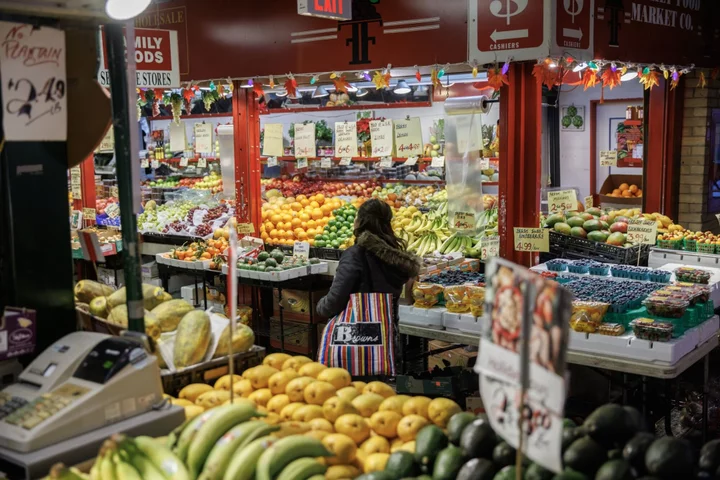A Bank of Canada official said there’s a risk firms will continue to raise prices more frequently and more sharply, complicating efforts to bring inflation back to 2%.
In a speech in Montreal, Deputy Governor Nicolas Vincent said that while the bank sees signs that corporate pricing behavior is gradually returning to normal, it’s still not what it was before the pandemic and progress is slow.
“If recent pricing behavior settles into a new normal, it could complicate our return to low, stable and predictable inflation,” he said on Tuesday.
It’s the first speech by Vincent, who is the first deputy governor appointed to the shorter-term, “non-executive” role on the bank’s six-person rate-setting council.
Last month, the central bank held interest rates steady at 5%, but again cited corporate pricing behaviors among indicators they’re watching as they assess their progress on achieving price stability. Inflation re-accelerated to 4% in August.
“It is clear that we are not out of the woods yet,” Vincent said, acknowledging slower-than-expected progress on disinflation and the persistent stickiness in underlying price pressures. “An unusual amount of uncertainty continues to cloud our view.”
The comments come amid growing speculation that that borrowing costs will stay higher for longer, possibly further pressuring firms to keep raising prices. Canada’s bond market followed the US lower on Tuesday, a selloff following a national holiday on Monday that pushed the yield on Canada’s 10-year government bonds to 4.25%, the highest since 2007.
When input costs are quickly rising amid strong consumer demand, companies are more likely to make “larger and more frequent price adjustments,” Vincent said.
That pricing behavior may not be captured by most commonly used macroeconomic models, he argues, a possible explanation for why central banks have struggled to fully account for the impact of supply and demand imbalances on inflation after the pandemic.
The issue is also important politically. Last month, Prime Minister Justin Trudeau asked grocery executives to work to stabilize food prices amid mounting affordability concerns. The sector has become increasingly targeted by politicians and some economists as evidence of “greedflation,” the idea that the pursuit of corporate profits is a key driver of inflation.
In the speech, Vincent noted that prices in the retail food sector have moved “roughly in lockstep with costs” over the last few years, even during the period of higher inflation.
But he also said that Canadian firms continue to expect their price changes to remain larger and more frequent than they were before the pandemic.
There’s a risk the unusual pricing behavior will prove sticky, driven by permanent shifts in technology or industrial structure, such as electronic tags that reduce the costs of price changes, he said. It could also become self-perpetuating, in which expectations that suppliers and competitors will frequently change prices create a “feedback loop.”
At a question-and-answer session after the speech, Vincent also reasserted the primacy of getting all the way to the 2% inflation target, which he views as an important anchor for expectations and behavior.
“Our role is to assure you that we will do everything necessary to reach 2% so that you no longer have to think about it,” he said in French.
Governor Tiff Macklem and his officials announce their next interest-rate decision on Oct. 25, where most economists surveyed by Bloomberg expect the Bank of Canada will hold borrowing costs steady at 5%.
--With assistance from Mathieu Dion.
(Adds context on bond market in paragraph 7, quote from Q&A in paragraph 14-15.)









